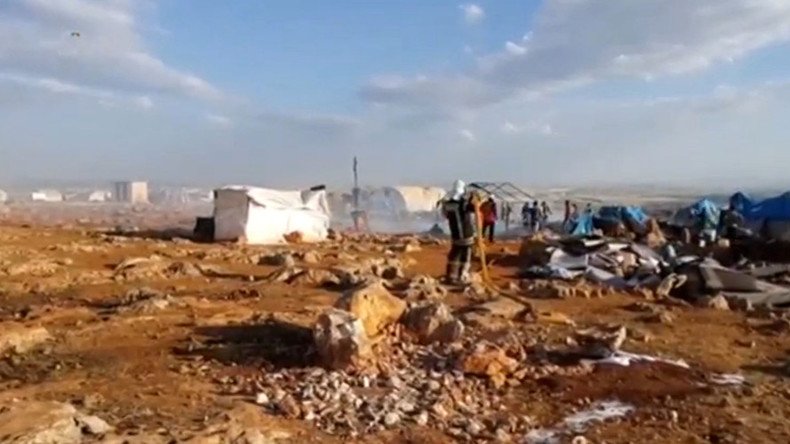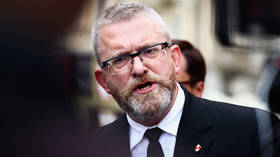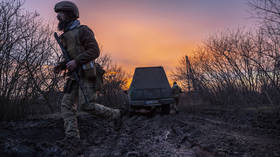The Sarmada bombing & the selective outrage of Philip Hammond

British Foreign Secretary Philip Hammond didn’t take long to pin the blame on Thursday’s bombing of a refugee camp near the Turkish border in Syria on President Assad - even though there was no evidence that Syrian air forces were responsible.
"The Assad regime’s contempt for efforts to restore the cessation of hostilities in Syria is clear for all to see," the neocon declared in a bellicose statement.
Not only did Hammond blame the Syrian government for a ’horrifying’ attack, which the government has denied (and which could have been carried out by Al-Nusra Front), he also took a swipe at ’the regime’ for - wait for it - holding a classical music concert in the ruins of Palmyra - the historic city which was liberated from ISIS by Russian and Syrian forces in March.
He described the event, which featured renowned Russian conductor Valery Gergiev, as a "tasteless attempt to distract attention from the continued suffering of millions of Syrians." Thank you for the music? Not as far as the ill-tempered Mr Hammond is concerned.
As political analyst Dan Glazebrook said on RT, Hammond and the UK government would "rather see the amphitheater in Palmyra being used for executions and murders" than host a concert with great music and a Russian conductor.
Hammond’s response to Thursday’s tragedy was in contrast to the more measured line taken by the US.
"We’ve seen early claims that this was a regime strike, but we just want to be absolutely sure before we level blame at somebody," State Department spokesperson Mark Toner said.
Toner admitted that the US did not have "eyes on the ground" so could not say straight away who carried out the attack - unlike Hammond who clearly has magnificent 'Hawk Vision' and can see all the way from London to north-west Syria.
It’s not the first time that the British Foreign Secretary has proved less diplomatic than his US counterparts.
Remember when Russia announced its military withdrawal from Syria in March?
Here’s what State Department spokesperson Mark Toner said: "If indeed Russia’s actions are intended to bolster this cessation of hostilities and strengthen the political or the proximity talks towards a political process, then this is clearly something that we believe could be helpful to the Syrian people and we would welcome that".
Now compare that to what Hammond the Hawk said: "Somebody goes in to another country, starts bombing civilian populations, destroying hospitals and schools. If they decide they have done enough, let's not give them too much praise. It's a bit like 'did he stop beating his wife'… The fact they are there in the first place is something we have to continually protest about. We certainly should not give them any credit for simply withdrawing from these illegal activities."
Quite a difference, eh?
On 5th April, US Secretary of State Kerry praised Russia’s "constructive" role in major diplomatic breakthroughs, not just in Syria, but with Iran also.
"Everybody doubted whether Russia would play any constructive role whatsoever with respect to the cessation of hostilities […] and we got the cessation of hostilities because they played a positive role,” Kerry told PBS.
By contrast, there’s been no similar acknowledgement of Russia’s "constructive role" by Hammond. He’s a man who seems physically incapable of uttering any words of praise for Russia.
When Turkish air forces shot down a Russian plane in November, which led to one the pilots being killed, Reuters reported that John Kerry "offered his condolences for the loss of life in yesterday's incident with Turkey." He urged for calm and for dialogue between Turkish and Russian officials in the days ahead [and Kerry] "underscored the importance of progress toward a diplomatic solution in Syria".
Philip Hammond by contrast was keen to stress that despite the incident Turkey was - and would remain - a "very important ally" for Britain. The Foreign Secretary who was so quick off the blocks to blame the Syrian government for this week’s refugee camp bombing, said of the shooting down of the Russian plane: "Clearly this is potentially a serious incident, but I think it wouldn't be wise to comment any further until we've got more certainty on the facts."
Well, not having any "certainty on the facts" didn’t stop him commenting very quickly on Samarda did it?
Hammond doesn’t seem to regard all hits on civilian targets to be equally "horrifying". Last year, for example, Amnesty International investigated five air strikes on schools that took place during the Saudi-led bombing of Yemen. "The Saudi Arabia-led coalition launched a series of unlawful air strikes on schools being used for educational – not for military – purposes, a flagrant violation of the laws of war,” said Lama Fakih, Senior Crisis Advisor at Amnesty.
In January, a UN panel revealed"widespread and systematic attacks" by Saudi-led forces on civilian targets in Yemen - including "camps for intern tally displaced persons and refugees".
Do you remember Philip Hammond coming out to condemn these attacks? No, me neither. Only two days ago, the Foreign Secretary declared that Saudi Arabia’s bombing campaign had not breached international humanitarian law.
When he was asked in the House of Commons by Labour’s Hilary Benn about attacks on MSF hospitals in Yemen, Hammond replied: "We need to be careful here. The MSF hospital attack in Sadaa is still being investigated, but so far there is no evidence that it was hit by a missile, although it clearly came under attack."
Again: Can you spot the difference between those cautious words and what Hammond said about the attack on Samarda this week? Meanwhile, as Britain continues to sell arms to Saudi Arabia (arms sales in the first six months of 2015 totaled £2.5bn) and Yemen, the Saudis are getting support from the British and US military.
The British Foreign Secretary didn’t seem too outraged either when the US bombed a MSF hospital in Kunduz, Afghanistan last October - an attack which killed 42 people.
But when Hammond thinks Russians or Syrians can be blamed, it’s a very different story.
"Horrifying reports of IDP camp bombed in Syria", he tweeted on Thursday.
Horrifying reports of IDP camp bombed in #Syriahttps://t.co/pYXPYrNMwg
— Philip Hammond (@PHammondMP) 5 May 2016
And after the US attack on the MSF hospital in Kunduz?
Russian incursion into Turkish airspace raises stakes in what is already a high risk situation. Call on @mfa_russia to desist.
— Philip Hammond (@PHammondMP) 5 October 2015
"Russian incursion into Turkish airspace raises stakes in what is already a high risk situation. Call on @mfa_russia to desist."
Follow Neil Clark on Twitter
@NeilClark66
The statements, views and opinions expressed in this column are solely those of the author and do not necessarily represent those of RT.













